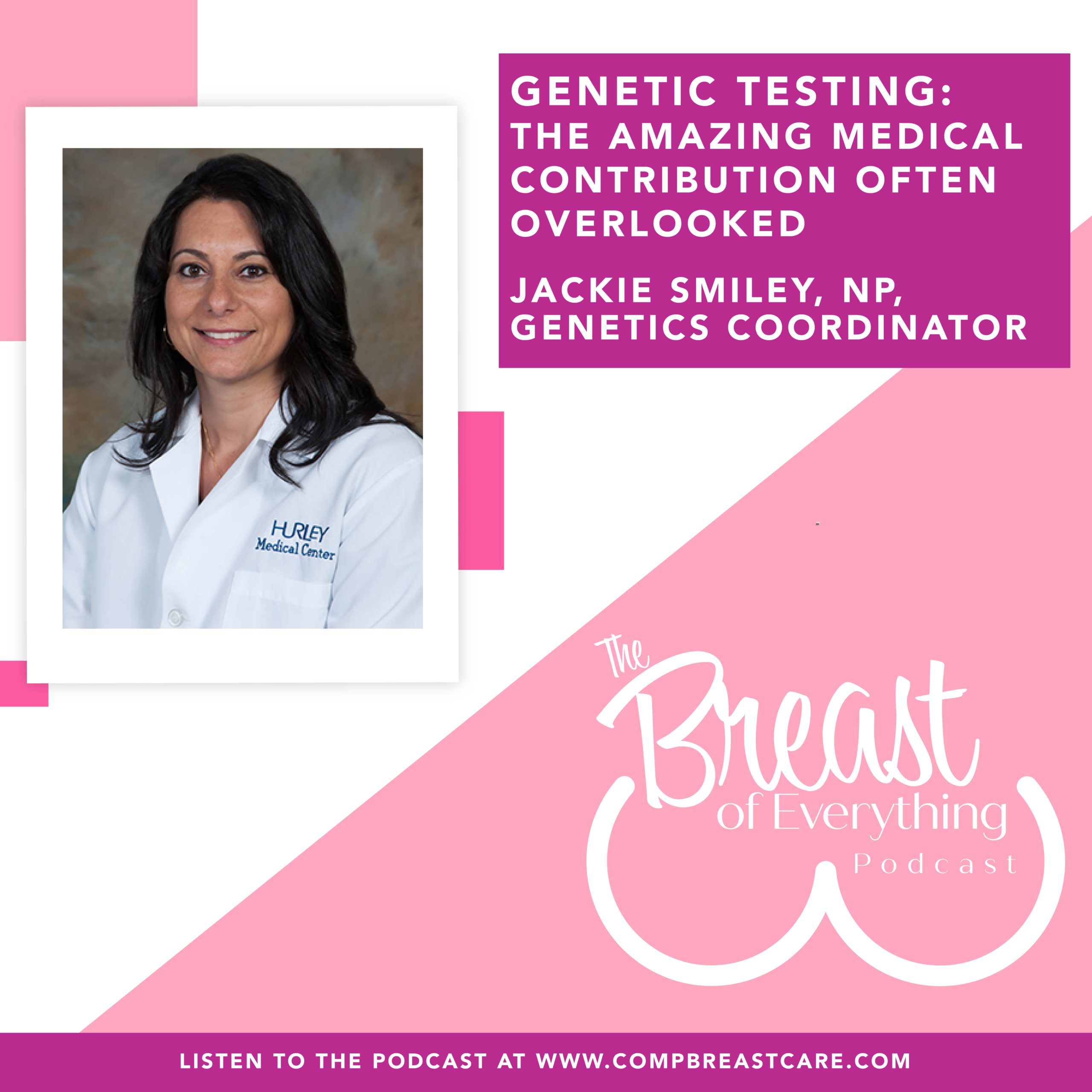Jackie Smiley on
Genetic testing: the amazing medical contribution often overlooked
Genetic testing: the amazing medical contribution often overlooked

Finding out if you have a genetic mutation can be lifesaving for patients, their families and future generations. Genetic testing plays a vital role in cancer prevention, early detection, and treatment. So much can be done once your physician knows if a mutation exists.
Jackie Smiley, nurse practitioner and high-risk genetics coordinator for Hurley Medical Center in Flint, Michigan, was a guest on The Breast of Everything, sharing her knowledge about genetic testing, and her own personal story. She is a 13-year breast cancer survivor with a BRCA gene mutation.
Jackie knows, not only from counseling patients, but from her own experience, why genetic testing can be a lifesaving measure people should not overlook.
Jackie’s family was immersed with cancer – five aunts, many uncles, a grandmother and other relatives. When she learned her father had a cancerous tumor, she made the decision to be tested and get a mammogram. She was not yet 40, the age when doctors recommend women obtain their first mammogram. They found two masses that had spread to her lymph nodes, and genetic tests revealed she was carrying the BRCA gene mutation. Jackie was lucky. She was the first woman in her family to survive cancer.
When patients ask her, “Why would I want to know if I have a genetic mutation if there is nothing you can do about it?” Jackie reminds them that there is so much they can do. There are many prevention options available today. Patients can reduce their risk of developing cancer by up to 90 percent!
“How do I know if I should get tested?” is another question Jackie often is asked. In general, if patients have a family history of breast or ovarian cancer, or if there is a known BRCA1, BRCA 2 or other inherited mutation in the family, testing is recommended. A genetic counselor can meet with you to determine if you would benefit from genetic testing. Anyone can seek genetic counseling to learn if the testing makes sense for them. You do not have to have a family history of cancer to be tested.
Cancer can run in families even if there is not a family history or an inherited mutation, she points out. And even if an abnormal gene is found and is linked to a higher breast cancer risk, not every person in the family will inherit the abnormal gene. A genetic counselor can provide advice on who should be tested.
A genetic counselor also will review the test results with you and explain what a positive test means. If you have a positive test result, this means you have a genetic mutation and you can begin to take proactive steps to reduce your risk of getting cancer. Your parents, children, sisters and brothers each have a 50 percent chance of having the same mutation.
A negative test result means no mutation was found, but this does not mean you will not get cancer. Your genetic counselor will discuss these findings, too.
Jackie also reminds women that paternal family history does matter. You can get breast cancer from either side of your family. Men pass along the mutations, too. You have a 50/50 chance of inheriting the mutation from your father’s side of the family.
Most insurances cover the cost of genetic testing. Tests usually include more than 40 gene panels (a gene panel is a test that analyzes multiple genes at once for cancer-associated mutations).
Jackie also notes that over-the-counter genetic testing kits only test for a few different variants. Exercise caution when purchasing these.
Don’t stick your head in the sand when it comes to learning your risk for cancer, she advises. It shouldn’t be a question of “if I get tested,” but “when should I get tested?”
__________________________________
If you have a subject you would like the surgeons to discuss, please email your ideas to https://compbreastcare.com. The doctors want to hear from you! The views, thoughts and opinions shared in “The Breast of Everything” podcasts are intended for general educational and informational purposes only and should not be substituted for medical advice, treatment or care from your physician or health care provider. Always consult your health care provider first.
